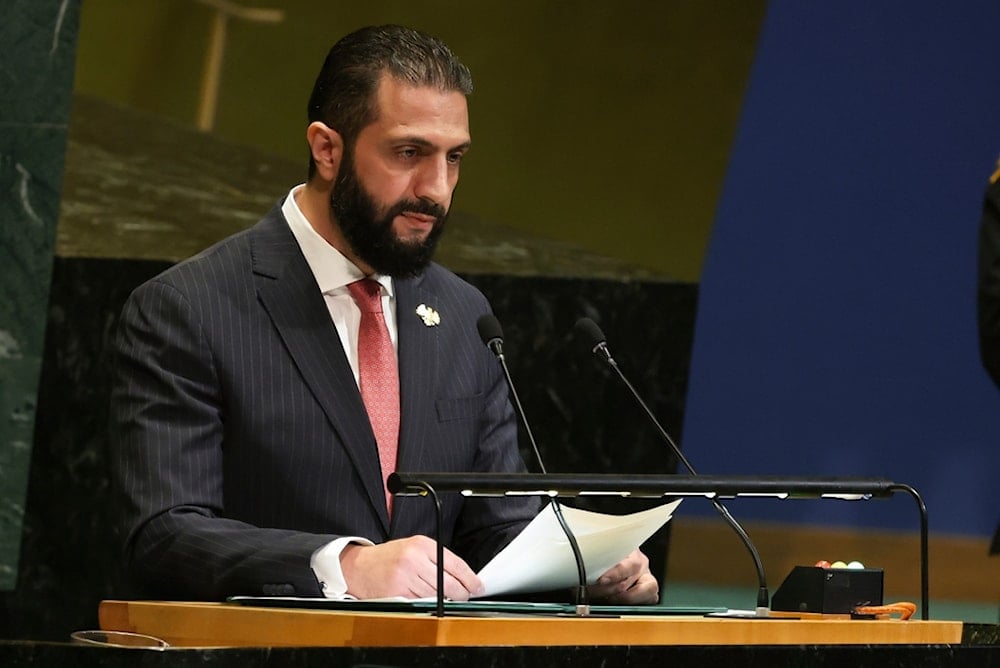Syria-Israeli talks collapse over last-minute Sweida corridor demand
Talks between Syria and "Israel" collapsed after Israel renewed demands for a "humanitarian corridor" into Sweida, which Damascus views as a pretext for expansionist ambitions under the guise of protecting the Druze.
-

Syrian interim President Ahmad Al-Sharaa speaks during the 80th session of the United Nations General Assembly, Wednesday, Sept. 24, 2025, at UN headquarters (AP)
Reuters on Friday reported that negotiations between Syria and "Israel" over a security pact collapsed after "Israel" renewed a demand to open a so-called "humanitarian corridor" into Syria's southern Sweida province.
Syrian officials rejected the proposal, viewing it as an attempt to erode sovereignty under the guise of aid, and sources said the last-minute push derailed what had been expected to be an announcement during the United Nations General Assembly in New York.
The proposed deal had centered on creating a demilitarized zone in Sweida, the heartland of Syria's Druze community, where deadly clashes in July claimed hundreds of lives.
"Israel," which claims it is acting to defend the Druze, a minority also present within the Palestinian borders, has repeatedly carried out strikes deep inside Syria. Damascus, however, has accused "Israel" of exploiting sectarian tensions to justify wider military interventions and to occupy Syrian territory.
Interim President Ahmed al-Sharaa, who took power after al-Assad's fall, warned this week that "Israel's" maneuvers risked derailing the fragile talks. "We are scared of Israel. We are worried about Israel. It's not the other way around," he said, underscoring Syrian fears that "Israel's" overtures for "security" mask ambitions of expanding control across southern Syria.
Talks Derail Sovereignty
According to sources in Washington, Israeli officials, and Syrian representatives, "Israel" had first raised the corridor demand during earlier talks in Paris, only to reintroduce it in the final stages of negotiation. The move stoked mistrust and cast doubt on "Israel's" intentions. US envoy Tom Barrack admitted that while discussions had once appeared close to a breakthrough, the focus has now shifted from a broad security framework to a narrow "de-escalation agreement." Under that formula, "Israel" would pledge to halt attacks while Syria refrains from moving heavy equipment near the Armistice Demarcation Line (ADL).
Syrian officials, however, remain skeptical. They note that "Israel" has openly opposed Sharaa's leadership, citing his past ties to jihadist factions, and has lobbied Washington to keep Syria weak and fragmented.
While Sharaa's government has sought to reassure backers and open channels with international actors, it faces the challenge of balancing the expectations of foreign powers with the demands of the population that insists on defending national sovereignty.
Expansion Under Pretext
Prime Minister Benjamin Netanyahu told the UN General Assembly he believed a deal with Syria was possible if it respected sovereignty and safeguarded minorities. Yet his office later clarified that "Israel's" red lines include the full demilitarization of southwestern Syria and explicit guarantees for Druze protection, conditions that Damascus sees as mechanisms to legitimize "Israel's" expanding footprint.
Read more: Syrian National Bloc defends Syria sovereignty, rejects US-backed deal
Nearly five decades after the 1974 disengagement agreement set up a UN-monitored buffer zone, "Israel" has escalated its military attacks across Syria, striking infrastructure and asserting control in territories left vulnerable after Assad's fall.
For Damascus, the latest talks illustrate how "Israel" continues to present itself as a protector while advancing an agenda that undermines Syrian unity and sovereignty.

 3 Min Read
3 Min Read








